While a little blood can be harmless, seeing blood consistently or frequently when your cat sneezes can indicate a concerning issue and should be considered an emergency situation. There are many causes of sneezing blood, commonly referred to as epistaxis or a bloody nose.
A nosebleed, or epistaxis, is caused by the blood vessels in the nasal passage breaking, bleeding, and leaking out the nares, or nostrils. The bleeding itself can cause some mild irritation leading to a bout of sneezing.
If there is enough blood, it can cause a bit of a mess. There are many different diseases or disorders that can cause epistaxis leading to sneezing blood such as infections, intestinal inflammation, foreign bodies, or allergies.
It is important that, if the sneezing is persistent, if there is a large amount of blood, or if the cat is acting sick, that you bring the cat to your veterinarian for treatment right away.
Causes of a Cat Sneezing Blood
Sneezing blood can lead to a brown/red discharge around a cat’s nose.
Sneezing blood, or epistaxis, can be caused by a variety of conditions. Some are critical, while others are mild.
1. Upper Respiratory Infections
An upper respiratory infection can be caused by a variety of different bacteria or viruses and is one of the most common causes of sneezing. These are common in cats and kittens as they are very contagious between cats.
Because they are so easily transmitted between cats, they are found most commonly in places with a large number of cats such as shelters, rescues, boarding facilities, and catteries.
Most of the common bacteria and viruses that cause upper respiratory infections can be prevented with appropriate and complete vaccination, as many of the inciting viruses are included in the kitten’s vaccine series and given yearly or every few years throughout the cat’s life.
The most common viruses causing upper respiratory infections are feline herpesvirus and feline calicivirus.
Read More: Cat Cold: Causes, Symptoms, & Treatment
The Feline herpesvirus is contagious between cats but not people. Symptoms are usually brought on by stress and include sneezing, nasal discharge, runny eyes, eye infection (conjunctivitis), cough, or congestion.
Feline calicivirus has similar symptoms but also commonly causes ulcers in the mouth or nose.
Both of these viruses can range from mild symptoms which are treatable at home but can also become severe needing management in the hospital. Often, a bacterial infection can start requiring antibiotics in addition to treating the other symptoms.
If a raw nose, ulcers, or excessive sneezing occurs, blood can be seen in the nasal discharge.
The feline leukemia virus (FELV) and feline immunodeficiency virus (FIV) are other viruses that affect a cat’s immune system and can be an underlying cause to frequent upper respiratory infections.
2. Fungal infections
Cats can get fungal infections if they inhale an excessive amount of a pathogenic fungus or if they have a compromised immune system.
The most common fungus to cause a nasal infection in cats is Cryptococcus neoformans. This causes swelling of the nose, destruction of nasal tissue, nasal discharge, sneezing with or without blood, and other symptoms of upper respiratory infections.
3. Clotting Disorders
Blood contains many substances, including platelets and clotting factors that are important that help the blood clot when there has been an injury. If the process of clotting is disrupted, or if some substances in the blood are deficient, it becomes more difficult for the bleeding to stop.
Rat poison is a common cause of such clotting disorders. Toxic ingestion of rat poison or ingestion of a small animal (such as a mouse) that has eaten the rat poison, can be deadly. If a cat eats an anticoagulant rodenticide, there are antidotes if treatment is sought out immediately.
Other causes of clotting disorders and low platelets in cats include liver failure, inherited clotting diseases such as hemophilia, viruses such as feline leukemia and Feline immunodeficiency viruses, immune-mediated thrombocytopenia, cancer, bone marrow diseases, and rare drug reactions.
The quickest way to find out if there is a problem with the platelets or other clotting and blood disorders, is to perform blood work checking platelet and red blood cell counts.
4. Injuries
A cat might be sneezing blood if there has been some kind of accident or injury to the face. This might be from a fight with another animal, a car accident, or other trauma where the head or face has been injured.
5. High Blood Pressure
Cats with high blood pressure may exhibit nose bleeds and sneezing blood. High blood pressure, or hypertension, occurs when the pressure of blood flowing through a vein is simply too high for the vein to withstand, this can cause excessive bleeding or clots. This issue can become worse when a cat is stressed.
6. Cancer
There are a variety of cancers that can be found in the nasal passages, face, or sinuses in cats. These can cause swelling, destruction of the nasal tissue, bleeding, infections, sneezing, and a bloody nose.
To find out if cancer is the cause of the sneezing or mass, a sample, known as a biopsy, is taken by the veterinarian and sent to a laboratory. Once there is a diagnosis, it can be determined if the cancer is treatable.
7. Foreign Material and Inhaled Irritants
Irritants or small objects that are inhaled through the nose and enter the nasal cavity can cause sneezing and even trauma to the sensitive tissue inside. The excessive sneezing and trauma can cause bleeding.
Some common foreign material that can be inhaled include dust, pollen, small pieces of grass or other plants, bugs, or other debris. These foreign objects must be retrieved through rhinoscopy (video scoping) up the nasal cavity.
Irritants that cats can be sensitive to when inhaling them include cigarette smoke, perfumes, sprays, cleaning agents, dust, mold, scented candles, and smoke from other sources.
Be cautious when using any of these materials around your cat.
8. Polyps
Polyps are small benign masses, or growths, that can be found in the nasal passages, ears, soft palate, or throat. These can become irritated and bleed.
9. Autoimmune Disease
Cats can get diseases that affect their immune system in various ways. These can be systemic or internal disorders, diseases affecting the blood cells, or conditions affecting the skin.
10. Allergies
Common allergies such as pollens, weeds, and dust can cause nasal irritation, sneezing, and inflammation, leading to a dry or bloody nose.
When to Call the Vet
Cats with bleeding from the nose should be examined by a veterinarian.
If you notice that your cat is sneezing blood, the first and most important thing to do is to stay calm. Cats are quick to pick up on stress and are likely already anxious because of their excessive sneezing and their nose bleeding. Staying calm while still acting quickly will help keep your cat’s stress level, and blood pressure, down. Catch your cat and restrain them in a safe area.
If the bleeding doesn’t stop quickly, or there is an excessive amount of blood, the best thing to do is to quickly take your cat to see your veterinarian. Even if there is only a minor issue, it is better to address it right away before it becomes a bigger problem. If something concerning is discovered, then treating it right away is critical.
Make note of when your cat started sneezing blood, how long it lasted, if it is from one or both nostrils, any medications the cat is taking, and any accidents or injuries that occurred.
Treating a Cat Sneezing Blood
Your vet will be able to advise on treatment after a full examination of your cat.
Treatment of your cat will depend on the cause of the blood. Infections and inflammatory conditions may be treated with antimicrobials and anti-inflammatory medication. Foreign bodies, polyps, tumors and other lesions may need to be assessed and then removed where possible. Other conditions, such as high blood pressure, allergies and autoimmune conditions may require lifelong management.
Whilst waiting for the veterinarian, remain calm. If the cat allows it, applying a cold compress, such as an ice pack, to the top or sides of the cat’s nose may help slow or stop the bleeding. Cleaning the face or nose with a cool damp cloth can also be helpful. Avoid these steps if it causes more stress and always ensure that you don’t obstruct your cat’s airway and ability to breath freely.
Prevention of Cat Sneezing Blood
We can’t always prevent our cats from getting ill, but there are some actions that cat parents can take to help keep our pets in optimal health.
- Vaccination: Certain infectious diseases that can cause blood when sneezing are treated with vaccinations.
- Regular check ups: Routine wellness exams may include testing for blood pressure and other important health factors.
- Seasonal caution: Foreign bodies, such as grasses, and allergies may be more common at certain times of year, so extra care may be warranted at these times.
Conclusion
While there are many reasons a cat might sneeze blood, the important things to remember are to stay calm and seek veterinary care to get to the bottom of the problem.
Frequently Asked Questions
Why is my cat bleeding from his nose?
There are many causes for a cat’s nose bleed, ranging from mild to severe. Your cat might have a viral or fungal infection, an injury, cancer, allergies, or a clotting disorder. To find out why your cat is bleeding from its nose or sneezing blood, take your cat to see your veterinarian. Your vet will perform an exam and the necessary tests to find out the cause of the nosebleed and start the most appropriate treatment.
What does it mean when a cat sneezes excessively?
Cats often have the occasional sneeze from a mild irritation. However, if you notice that your cat is sneezing excessively, it means that something is irritating its nasal cavity. Sneezing excessively could be a sign of allergies, an upper respiratory infection, or chronic irritation, amongst other less common causes.
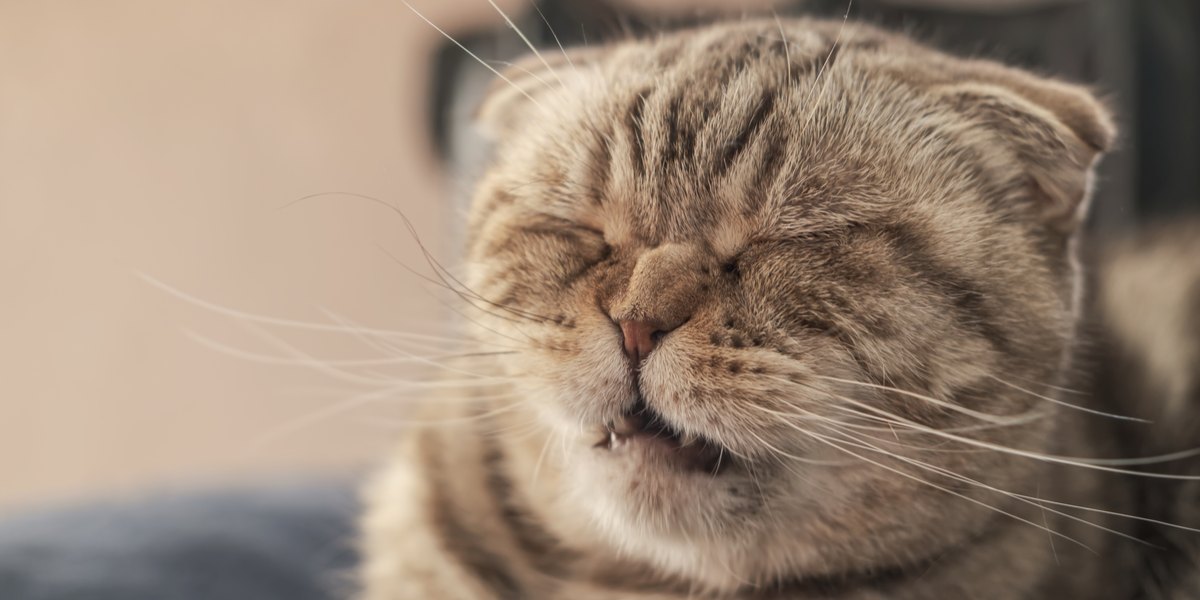
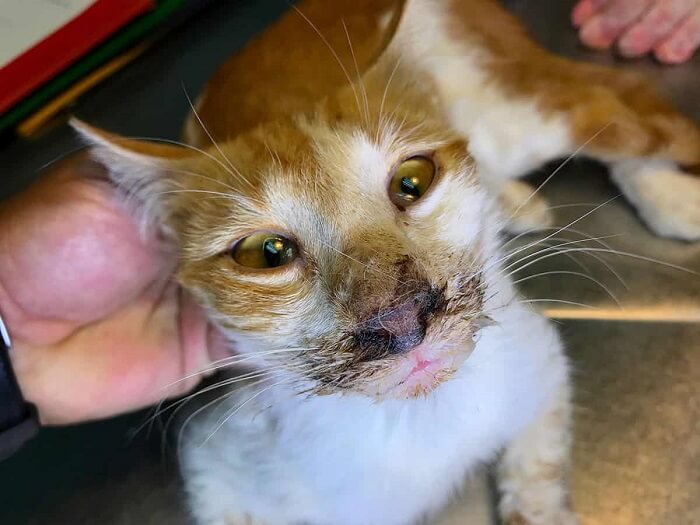
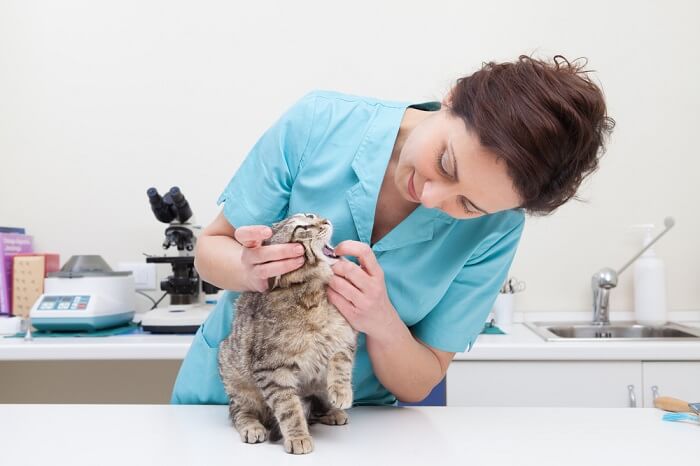
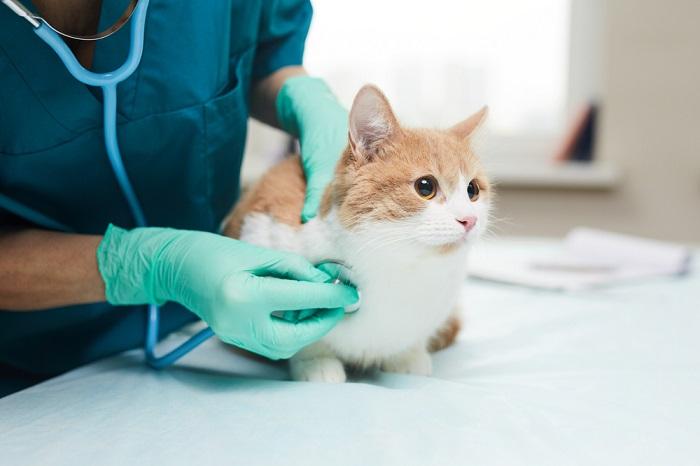

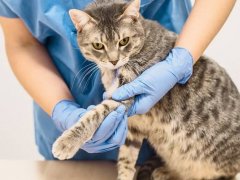

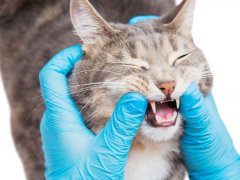


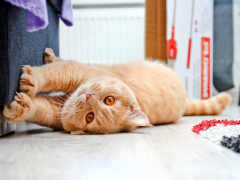
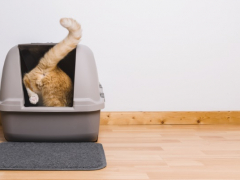
I just rescued a male cat that was dumped. He has been sneezing and coughing and das nasal discharge coming out of his nose. He is eating normally and using the restroom normaly. What can i do to clear this up for him. At the moment i dont have the money to take him to the vet. Please can you give me any advise on what to do. I am not a cat owner so i dont know much about them but this poor guy needed a cozy home and that what i want to give him. He is litter box trained and gets along with dogs so i know he was dumped. thank you
Hi Keli! Upper respiratory tract infections are pretty common in feral cats, so that could very well be what you’re dealing with. These infections are somewhat similar to the common cold for humans and they often resolve on their own within a few weeks. Since it sounds like the cat is eating and using the litter box normally, it might not be anything to worry about. If the cat starts losing weight or develops other symptoms, however, you might want to see if you can somehow manage a visit to the vet. Good luck!
Thank you for such good advice Dr, I am going through same thing ,but I’m running back & forth to the vet ,& she ends up w it 2 weeks later after a antibiotic, it’s just too expensive, she’s just like kells cat ,no other symptoms, I’ll remember your advice, thanks so much, regards Kelly
Wishing you all the best.
I have a 15yo Maine Coon cat. He had been wheezing so I took him to the vet. All blood work, etc, came back normal. Tried steroids & antibiotics to no avail. Doc says may be a nasal tumor and would need extensive work up. Now he’s sneezing blood everywhere, several times a day. Cannot afford the tests. How do I know if he’s suffering and it’s time to let go? He is eating, drinking and using the box.
Hello Sharon, I’m sorry you and your cat are going through this. You may appreciate our article on knowing when it’s time to euthanize a cat.
My foster has been sneezing with blood splatter since May. Multiple Vet visits already. Treated with many antibiotics for Calicivirus and Bordatella. Eye drops, ointments, nose drops, nebulizer. Nothing is ending the sneezing and weepy eyes. Frustrated for this kitty!!!
My cat sneezed a tiny bit of blood I don’t have money for vet what can I do it only happens when she sneezes
Hi Angela,
We recommend to post health related question on our forum and one of our vets can reply directly here:
https://cats.com/community/health-care